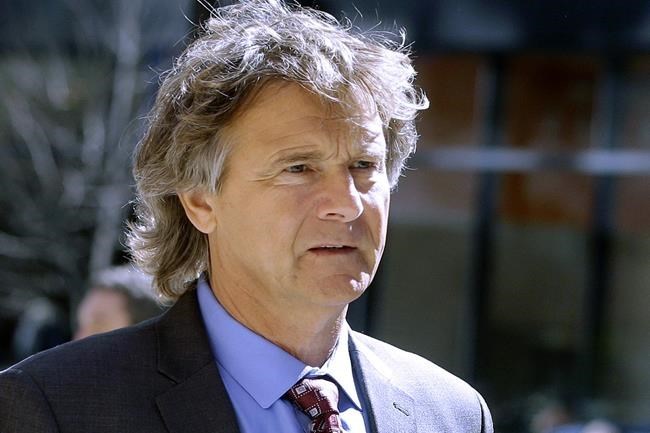
FILE - Jovan Vavic, a former University of Southern California water polo coach, arrives at federal court in Boston on March 25, 2019, to face charges in a nationwide college admissions bribery scandal. During closing arguments in Vavic's trial on Thursday April 7, 2022, his lawyer, Stephen Larson, said that the 60-year-old, who guided USC's men's and women's water polo teams to 16 national championships, was always acting in the best interests of the school and his team, never lied and never took a bribe. (AP Photo/Steven Senne, File)
Republished April 07, 2022 - 3:07 PM
Original Publication Date April 07, 2022 - 6:51 AM
BOSTON (AP) — A former water polo coach at the University of Southern California facing bribery and fraud charges was just doing what he could to raise money for his dominant, championship-winning program as athletic officials at the elite Los Angeles school had demanded, defense lawyers argued Thursday as the latest trial in the sprawling college bribery scandal wrapped up in Boston federal court.
Jovan Vavic’s lawyer, Stephen Larson, also said in his closing remarks that the 60-year-old, who guided USC’s men’s and women’s water polo teams to 16 national championships, was always acting in the best interests of the school and his team, never lied and never took a bribe.
“Yes he was trying to get money for his team, and yes he was doing whatever he could legally,” he said. “It is clear Jovan Vavic wanted to recruit some water polo players who could be legitimately admitted to USC and whose families could donate to USC. That was his mindset.”
But Assistant U.S Attorney Leslie Wright painted it as a clear-cut case of “quid pro quo,” or “this in exchange for that.”
She said Vavic took more than $200,000 in bribes to fake athletic credentials and designate college applicants as water polo athletes to get them into USC.
He also helped recruit others to the scheme, Wright said, pointing to wiretap transcripts in which Vavic called the arrangement a “win-win” situation and where he encouraged a fellow coach with doubts about the scheme to “just do it.”
“The defendant’s own words tell you what you need to know,” she told the jury, which will begin deliberating Friday.
Vavic is the only coach of the many implicated to challenge in trial his role in the scheme, which involved wealthy parents paying bribes to have their children admitted into elite schools using rigged test scores or bogus athletic accomplishments.
In all, nearly 60 people were charged in “Operation Varsity Blues,” including prominent coaches from Yale and other elite schools, as well as wealthy and famous parents such as “Full House” star Lori Loughlin and her fashion designer husband Mossimo Giannulli.
In court Thursday, Larson argued the money Vavic received went directly into a USC account for his team, and not his personal funds.
And he stressed his client believed the “tuition grants” paid directly to Vavic’s sons’ private high school for their education were legitimate payments from a nonprofit run by William Singer, who was considered the mastermind of the bribery scheme.
“The simplest explanation is sometimes the truth,” Larson said. “There’s no quid pro quo.”
He argued Vavic was a victim of USC’s desire to protect its reputation and cover up a “pervasive culture” of accepting wealthy students who could provide donations windfalls and that he’d been manipulated by Singer, who Larson branded a “con man” and “chronic liar.”
“This was part of USC,” Larson said. “It’s all about this wink and a nod. You don’t want this rep out there that USC is a place you can buy your way into.”
The university, which fired Vavic after his 2019 arrest, has stressed its admissions processes are “not on trial.”
Wright also dismissed Larson’s final arguments as a “sideshow.”
“Pretending to recruit unqualified candidates based on falsified credentials in exchange for money is wrong, no matter where the money goes or who else is doing it,” she said. “Common sense tells you it’s wrong. He crossed the line and in the process he broke the law.”
News from © The Associated Press, 2022